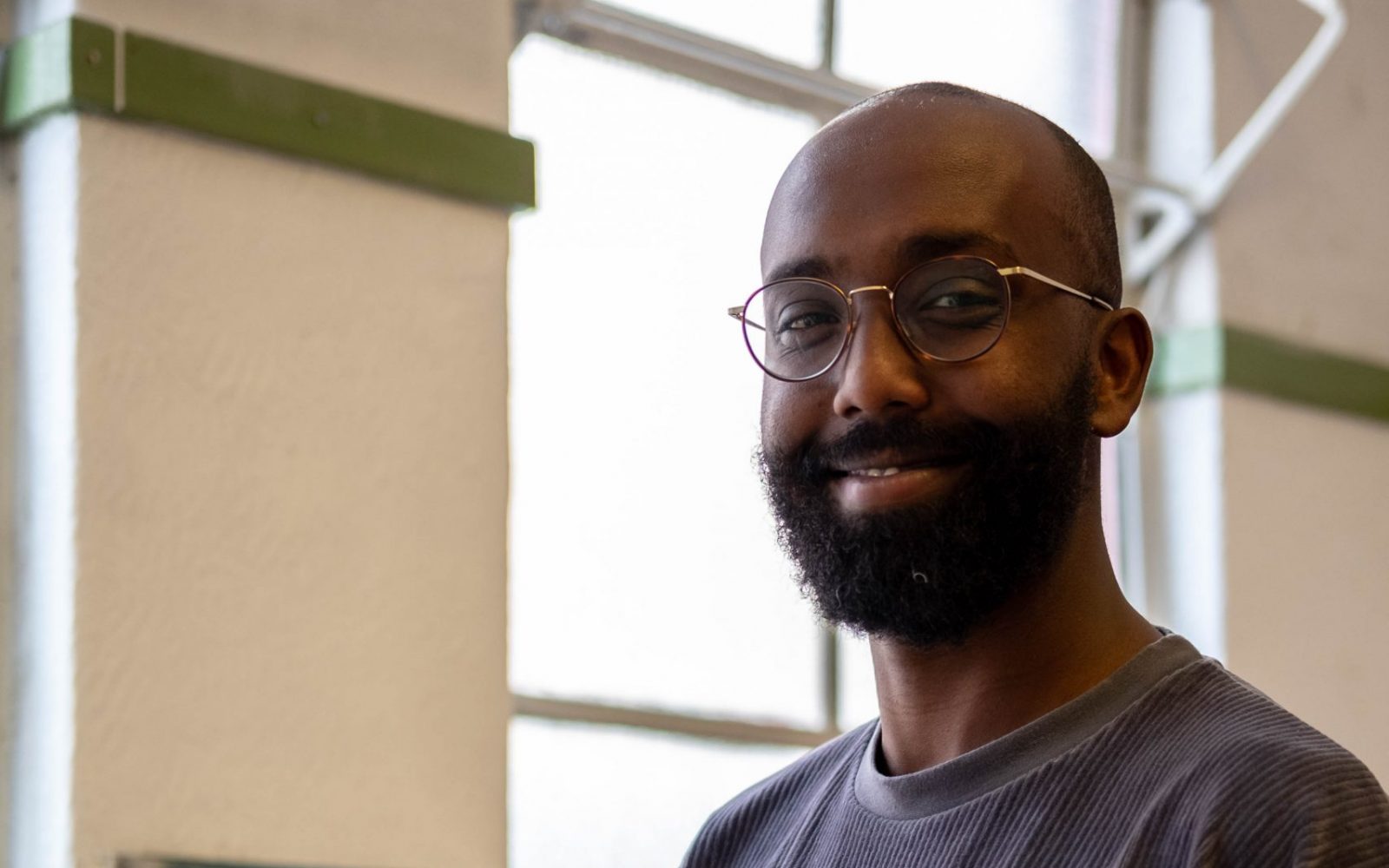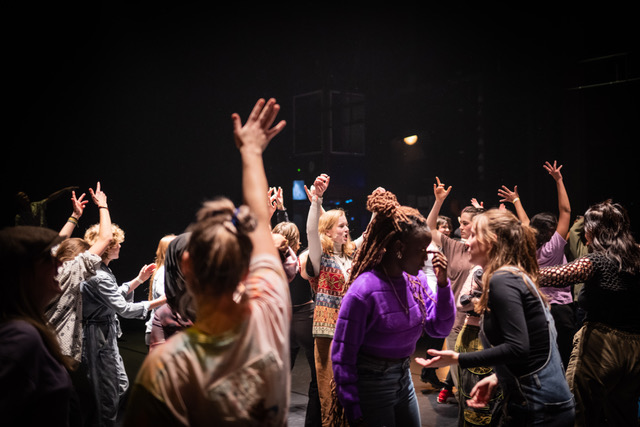Whatever you do, chase the rain
Jonge Harten will be working together with two main guest artists again this year: theatre makers who will contribute to and leave their mark on the programme. During the festival they will demonstrate their own (new) work or related work of other relevant makers. Our guests this year are Alexandra Broeder and Mohamed Yusuf Boss. In preparation for this year’s edition of Jonge Harten we talked with them about their work and our festival. What characterizes their work? How do they feel about working with young people? And of course: what are their plans for Groningen?
Whatever you do, chase the rain
Hip-hop, Ubuntu and football: they’re all combined in Mohamed Yusuf Boss’s dance performances. He never works alone and wants to point out the importance of giving and not only taking in life. The same goes for Jonge Harten. ‘You need others to move forward.’
It’s kind of strange to interview Mohamed Yusuf Boss on his own – even though he is a man of many faces: he’s a dancer, choreographer, dance instructor and theatre maker. But in all these roles, he’s always just a small part of a bigger story. ‘I don’t usually see things from just my own perspective’, he says before the interview has really even started. ‘For everything I make, credits in fact go to X Yusuf Boss, the group I work with.’
Net curtain stories
Yusuf Boss believes that the tendency to focus on oneself is embedded in Dutch culture. ‘My mother was astonished by this. I’m from Somalia, where life takes place in the streets. The people in that street, or with the same postcode, they are your family. Houses have large windows here, but when my mother drew the curtains after we’d left for school, she’d see empty streets. So she’d close the net curtains, so she could hold onto a bit of Somalia indoors.’
Yusuf Boss was born in Hargeisa in Somaliland, a country in between Djibouti, Ethiopia and Somalia, that isn’t officially recognized. When he was three years old, he fled the war in Somalia, together with his mother, three sisters and his little brother. His father remained in his native country. Interactions between different countries and cultures and seeing things from multiple perspectives play an important role in Yusuf Boss’s work. ‘I’m always curious to learn how people relate to each other and to each other’s worlds. Other people and their stories are always my starting point.’
A classroom full of ego’s
Yusuf Boss considers it a blessing to work with young people, in every way. ‘They see things differently and they look at things in a different way’, he says. They’re the perfect target group if you want to see things from a different perspective. But it’s also a challenging to work with young people, because their ego is so important to them. ‘In this stage in their life, their identity is still being formed. ‘Who am I?’ is a very important question for them, especially as they’re being tempted by social media to create online profiles and personas all the time.’
And don’t forget the numerous online coaches you see everywhere, who claim to help you become the best version of yourself, at great expense. ‘Children and adolescents are being taught to constantly focus on themselves,’, says to Yusuf Boss, who regrets this development. ‘What if you have a classroom full of egos, what effect will this have on the group?’
Sacrifice
Yusuf Boss comes up with an example, of three football players: Lionel Messi, Kylian Mbappé and Neymar da Silva Santos Júnior. ‘They are the best football players in the world, and they’re in a team together, Paris Saint-Germain. But they stand out individually. Ajax doesn’t have any star players, but their achievements are just as good: they’re a real team.’
So it’s worth it to put your selfishness aside sometimes. Like Yusuf Boss’s uncle did when he decided to take on the care for his grandmother. ‘My uncle’s life revolves around my grandmother’, says Yusuf Boss. ‘There aren’t any old people’s homes in Somalia, so people need to sacrifice things to a certain degree; so that people can look after each other. It can be difficult, because you may have to choose your family over your career, for instance. But it also teaches you how to do things together.’
‘Guns ’n bitches’
Yusuf Boss draws inspiration from hip-hop culture, which is all about being part of a collective and sharing. He also advocates the principal each one teach one: make sure you don’t just take, but that you also provide.
That’s why Yusuf Boss decided to study Ubuntu, the African philosophy that is all about giving and taking, and the concept of not existing without the other ‘You always need others to be able move forward. That’s why I always try to be curious and open, and to hit the streets whenever I can. I try to find similarities, but I also enjoy celebrating the differences. In that way I continue to learn new things.’
Echoes of home
Yusuf Boss’s approach led to the performances SHAN (2016), AFAR (2019), KÓW and LíX; dance performances that combine hip-hop with traditional Somalian songs, and in which he examines what it means to grow up in the Netherlands as a first-generation Somalian. He has now been invited to work on a new project by Club Guy & Roni, called Laba (Somalian for two), a dance performance about rootlessness and finding out where you belong, and the relationship between individuals and a country or home that is not officially recognized.
Yusuf Boss: ‘Which echoes resonate when you can’t go back home, and how do they make you feel? That’s something I want to examine.’ This performance doesn’t only include hip-hop, but also ‘haka’, a ceremonial dance of the Maori from New-Zealand, which corresponds with the nomadic character of the Somalian people. ‘In Somalia people often follow the rain. Because there’s always the threat of drought, rain is considered almost sacred, says Yusuf Boss. ‘Chase the rain’ is what they say. It’s the same with life: you sometimes have to leave a place, in order to be able to settle down in a new, fertile location. I’m trying to incorporate this concept in the piece.’
AFÁR XL
So what does this mean for Jonge Harten? In any case that there are new plans for the already existing piece AFÁR, that was partly inspired by the riots in Hong Kong. Yusuf Boss: ‘it includes a scene about revolution. We now want to make an XL-version of this performance, with as many dancers on stage as possible: the army of the future.’
The idea is that the dancers wear masks, which they take off during this scene. ‘So first you see the group, or the collective, and then you see the people behind it, and their expressions; how do they perceive the future? It will be great to combine this image with that dance.’
Your world, my world
The coming months will also be all about coming up with ideas and trying things out. Yusuf Boss and his team will probably be working with photos and letters, but also with lullabies and other personal documents. ‘I collect all of them, he tells us – a habit that took root in his Somalian background. ‘In Somalia oral history is very important. A lot of stories are told from one generation to the next. If you stop telling them, they’ll disappear. That’s why I collect images. There’s often a whole story behind one photo.’
Whatever happens in the coming period, Yusuf Boss’s main goal is to see how X Yusuf Boss and Jonge Harten can reinforce each other. ‘As a company we try and take our world to Jonge Harten. And I hope that young people will bring their world to us. If that more or less works out, I’m happy.’



Play around